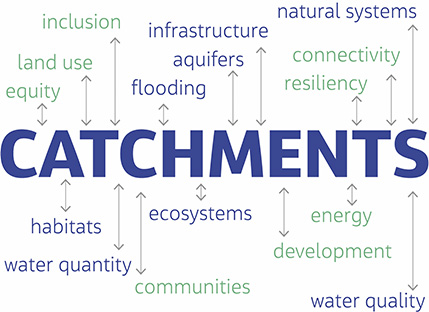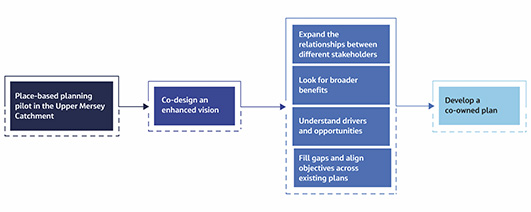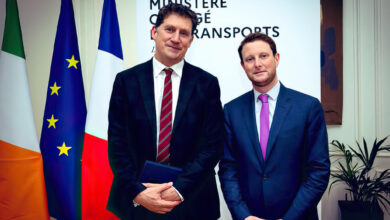Aiming higher with catchment partnerships

Water is one natural resource we all share. Within and across catchment and community boundaries, there are many interconnected challenges to managing this precious resource, and these are exacerbated by multiple factors: increasing population, growing urban areas, impacts from a changing climate, equity, and affordability, writes Jillian Bolton, Ireland and Scotland Regional Lead, Water – UK and Europe, Jacobs.
This requires catchment-specific integrated solutions to benefit local communities, which are rooted in the context of the water cycle. At Jacobs, we call this approach OneWater1, with three foundational elements:
• All water has value: We understand what makes each catchment, community, and water-related challenge unique. Given the demands on our water systems, there can be no ‘wastewater’.
• Water challenges are interconnected: We recognise the interconnections among elements of the water cycle and, perhaps most importantly, synergies with all economy sectors. Collaboration outside of the water sector is essential to deliver solutions that provide environmental, economic, and social benefits, and unlock funding and finance opportunities.
• Water solutions must be sustainable, inclusive, and equitable: We understand that in developing water solutions, all voices are important. We work to develop and strengthen partnerships, and a shared vision across the many parties responsible for, and impacted by, water.
In Ireland, significant steps have been taken to support integrated approaches, through the development of the River Basin Management Plan2, delivering on the requirements of the European Water Framework Directive (2000)3. Consultation on the third cycle of the Plan4 concluded earlier this year, setting out the updated strategy and actions, including the development of integrated catchment management plans for the 46 catchments in Ireland. Development of these plans will be co-ordinated by local authority regional committees and supported by the Local Authority Waters Programme (LAWPRO)5. Individual local authorities will also develop county level implementation plans.
The development of integrated catchment management plans presents a great opportunity for Ireland to lay the foundation for addressing the many challenges faced, not only in meeting the needs of the water environment, but to leverage the importance of water to deliver wider social, climate and environmental objectives.
Catchments are complex systems comprising of many interacting parts. A change within one part of the catchment may result in both direct and indirect impacts which propagate through the system. Mitigation measures can be implemented to reduce negative impacts within the catchment, but due to the complexity of the system, providing the “right measures in the right place” requires collaboration and partnering.

Figure 2: Upper Mersey Catchment place-based planning approach, providing outcomes beyond infrastructure.

Typical catchment (or river basin) plans tend to organise the water-related challenges around established operational, regulatory and ownership structures. Therefore, management roles and actions assigned to stakeholders are in line with existing mandates. While typical plans provide a mechanism for co-ordination among established entities, the plans provide little, if any, flexibility for stakeholders to move beyond those roles.
Truly integrated approaches are not possible within the existing siloed water environment. OneWater approaches to catchment plans would focus on partnerships, leverage water as the connector, and aim higher for sustainable, inclusive and equitable outcomes across the catchment.
The development of integrated catchment management plans presents a great opportunity to implement OneWater thinking (see Figure 1), meeting the needs of the water environment, and achieving wider social, climate and environmental objectives.
The planning process for the Upper Mersey Catchment in England is an example of a OneWater approach. This catchment, like many in Ireland, faces traditional challenges in terms of water quality, flood risk and water supply resilience, as well as impacts from a changing climate, population growth and future development. The Upper Mersey Place-Based Planning pilot identified how stakeholders can collaborate more effectively, breaking down the silos that exist between organisations in order to meet the challenges of managing water now and in the future.
Jacobs has been the knowledge facilitator on the project, which was driven by a leading water utility, in partnership with a wider pool of stakeholders, including the environment regulator and local authority. This engagement allowed each of the key partners to be an equal partner rather than ‘leading’ the narrative, and engage in an agenda that is catchment-focused, rather than one that is more oriented towards specific operational outcomes. Jacobs’ multi-disciplinary delivery team illustrates the evolution from traditional plans by providing not only the catchment-based, systems-thinking, start-to-finish domain knowledge, but also a holistic, place-based, digital, and design-led approach. The project has, to date, focused on a co-design approach (see Figure 2) to bringing partners and stakeholders together to develop.
We are now embarking on a ‘coordinator’ role for a pilot on the River Tame (within the Upper Mersey), with the aim of working through place-specific questions of leadership, governance, vision, and objectives, before embarking on developing an action plan to address catchment-related issues. We expect these actions to be a combination of more traditional capital schemes, nature-based solutions, land management practices and enhanced social value supported by community engagement.
Delivering place-based plans is a key pillar of the relationship between regulators and water managers. It will play a role in delivering on strategic objectives aimed at climate resilience, carbon reduction, nature recovery, flood management and general environmental enhancement, with a pipeline of future schemes matched with a co-funding investment strategy.
Adopting a OneWater framework for integrated catchment management plans in Ireland that embraces partnership approaches, with shared ownership of delivery and the development of working relationships, has the potential to provide the platform for a resilient, sustainable water future for Ireland.
E: jillian.bolton@jacobs.com
W: www.jacobs.com






